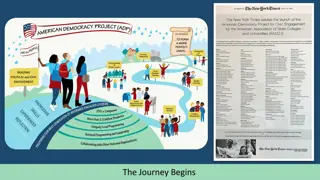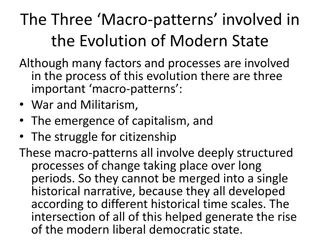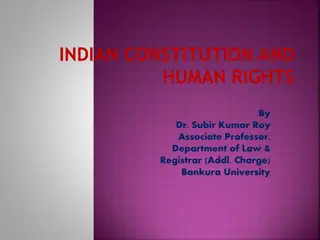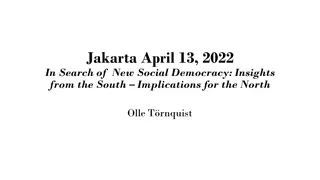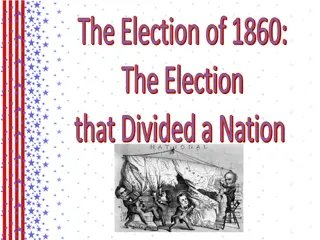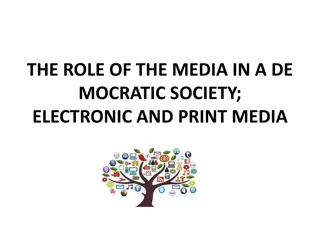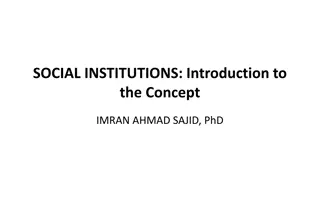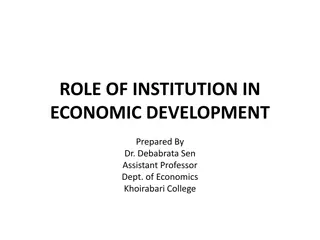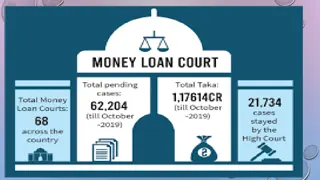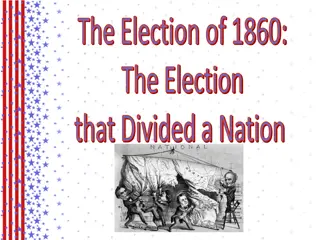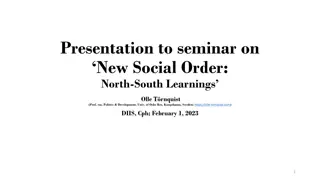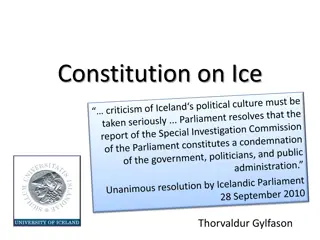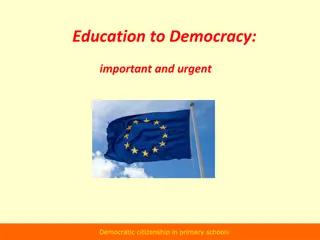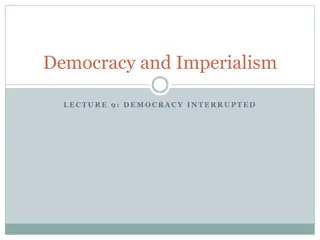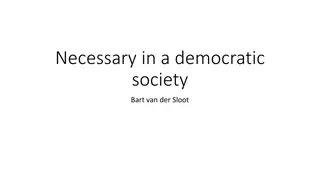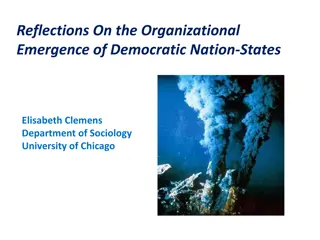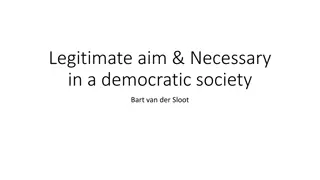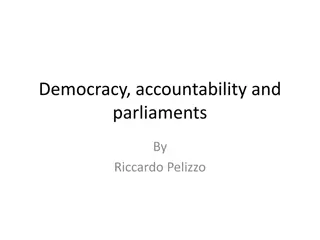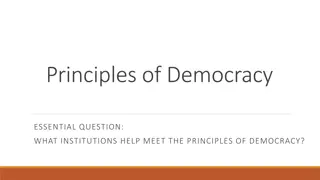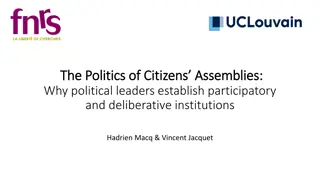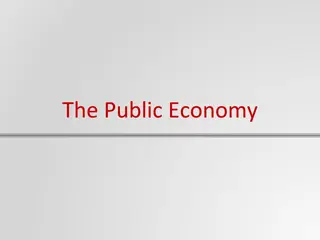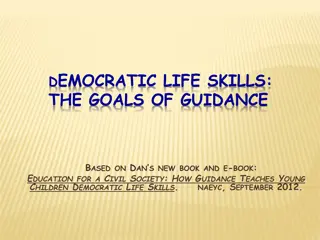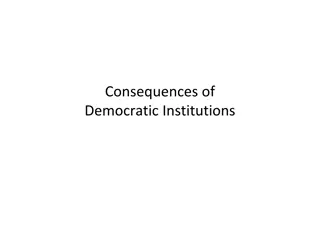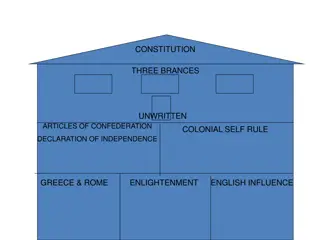Overview of AANAPISI Program in the United States
The Asian American and Native American Pacific Islander Serving Institutions (AANAPISI) Program aims to support institutions with a minimum of 10% Asian American and Native American Pacific Islander undergraduate enrollment. Currently, there are 54 funded AANAPISI institutions across 16 states and t
0 views • 13 slides
The Journey Begins
Initiatives like Voter Education, Deliberative Dialogue, and addressing Global Challenges are pivotal in fostering civic engagement and informed citizenship. The Theory of Change underscores the importance of integral, relational, organic, and generative approaches in democratic engagement efforts,
0 views • 16 slides
Democracy in the EU and Upcoming European Elections Overview
Explore key findings on the state of democracy in the EU, upcoming European elections, and global trends. Europe remains a high-performing region, with Central Europe showing notable democratic growth. Discover how the EU acts as a countervailing institution and challenges faced by strong democracie
0 views • 15 slides
Understanding Active Citizenship & Civic Engagement: Definitions and Importance
Encouraging citizens and organizations to actively participate in civil society and decision-making processes is vital for a democratic society. Active citizenship involves participation in public affairs, civil society, and political life with a focus on human rights, democracy, and community well-
1 views • 22 slides
Evolution of Modern State: Three Macro-Patterns Explored
The evolution of the modern state is influenced by three key macro-patterns: War and Militarism, Emergence of Capitalism, and Struggle for Citizenship. These patterns involve deep processes of change over long periods, contributing to the development of modern liberal democratic states. War and Mili
0 views • 13 slides
Indian Constitution and Human Rights: A Comprehensive Overview
The Indian constitution embodies justice in social, economic, and political spheres, aiming for the full development of every individual. Rooted in democratic principles and socialism, the preamble emphasizes liberty, equality, and justice. Drawing wisdom from leaders like Dr. Ambedkar and Mahatma G
0 views • 10 slides
Insights into the Evolution of Social Democracy in the Global Context
Exploring the challenges and transitions in social democracy from both Northern and Southern perspectives, this research delves into the complexities of needs-driven development based on social justice through democratic means. The author reflects on the decline of social democratic movements and pr
0 views • 15 slides
The Election of 1860: A Divisive Campaign for the Future of the United States
The 1860 election was a significant moment in American history, marked by ideological divisions and the rise of Abraham Lincoln. The Republican Party, Southern Democratic Party, Democratic Party, Northern Democratic Party, and Constitutional Union all played crucial roles in shaping the outcome. The
1 views • 14 slides
The Role of Media in a Democratic Society: Electronic and Print Media Overview
Media plays a crucial role in a democratic society by informing, entertaining, and educating the public. Both electronic and print media provide news, entertainment, and valuable information to society, highlighting events, promoting open debate, exposing violations, and shaping public opinion. The
3 views • 19 slides
Understanding Social Institutions: An Introduction by Imran Ahmad Sajid, PhD
Discover the concept of social institutions through Dr. Imran Ahmad Sajid's explanation. Explore how institutions are established practices that shape complex social forms, distinguishing between institutions and conventions, and their relation to society and culture. Delve into the role of institut
0 views • 14 slides
Role of Institutions in Economic Development: A Comprehensive Analysis
Understanding the significance of institutions in economic development is crucial, as they play a pivotal role in shaping societal, political, and economic relations. Institutions, defined as established customs or practices, act as the rules of the game that structure human interactions. Their qual
0 views • 13 slides
Cooperative Ownership and Democratic Participation in Economic Models
Explore the principles of cooperative ownership, democratic participation, and economic models as advocated by Jessica Gordon-Nembhard. She emphasizes the historical significance of collective work, indigenous cooperative efforts, and the values of shared risk and surplus sharing in community-owned
0 views • 71 slides
Artha Rin Ain 2003: Special Legislation for Financial Institutions' Debt Recovery
Artha Rin Ain 2003 is a special legislation aimed at enhancing the recovery process of outstanding debts of financial institutions in Bangladesh. The law addresses the shortcomings of previous acts and establishes dedicated courts for the swift resolution of cases involving unpaid claims. It encompa
0 views • 15 slides
Insights into Voting Systems and Arrow's Impossibility Theorem
The content delves into various voting systems, including the conditions necessary for a voting system to be fair and democratic. It discusses the challenges faced by democratic voting systems, such as Arrow's Impossibility Theorem, which states that no voting system can satisfy all desirable axioms
0 views • 20 slides
The Election of 1860: A Historic Moment in American Politics
The election of 1860 was a pivotal moment in American history, marked by the rise of the Republican Party with Abraham Lincoln as its candidate. This election showcased the division in the Democratic Party, leading to the victory of Lincoln despite hostilities between the North and South. The Consti
4 views • 14 slides
Social Democratic Politics: Pillars and Strategies for Transformation
Social democratic politics is rooted in democratic collectivities and rights, aiming to reshape capitalism through reform, regulation, and transformative strategies. Olle Törnquist delves into the historical foundations and the need for comprehensive reforms to challenge the dominant logics of capi
3 views • 10 slides
Iceland's Constitutional Journey: From Economic Collapse to Democratic Reform
Iceland faced a unique situation post the 2008 economic collapse, responding with an IMF-supported rescue, financial fraud prosecutions, and a constitutional reform movement. Despite challenges, strong popular support and civic pressure pushed for political accountability and a new constitution, ref
0 views • 15 slides
Importance of Democratic Citizenship Education in Primary Schools
Promoting democratic citizenship education in primary schools is essential for fostering a sense of community, conflict resolution skills, empathy, and embracing diversity among students. The curriculum focuses on themes like group cohesion, conflict resolution, communication, empathy, community par
0 views • 9 slides
Exploring Values Education in Nordic Preschools
This study delves into the perception and handling of values in Nordic preschools, focusing on caring, disciplinary, and democratic values. It aims to uncover whether conflicting or co-existing values prevail within individual preschools and across Nordic countries. Definitions of values, including
0 views • 16 slides
Challenges to Democracy: An Historical Perspective
Explore the historical instances of democracy being interrupted in Ancient Athens, from the Periclean Peloponnesian War to the oligarchic regimes of 411 and 403 BC. Delve into the reasons behind the dissolution of democracy, the responses of Athenians to such interruptions, and the oligarchs' aims t
0 views • 24 slides
Necessity Test in a Democratic Society: Balancing Public vs Private Interests
The necessity test in a democratic society involves balancing public interests such as security, morality, and environment against private interests. The test determines whether an infringement is necessary and legitimate, or unnecessary and a violation. Different categories like security-related ca
0 views • 36 slides
Enhancing Democratic Electoral Processes in Africa: Challenges and Solutions
Democratic electoral processes in Africa must strive to be inclusive, transparent, and accountable to promote public confidence. The importance of independent and professional electoral governance institutions is emphasized to address the legitimacy crisis facing elections today. The SADC Secretaria
0 views • 13 slides
Understanding Voter Outreach Laws for Schools and Colleges
Explore the requirements for voter registration in high schools and postsecondary institutions. Learn about the obligations of school districts to provide voter registration applications to eligible students and the importance of voter participation in educational settings. Discover how institutions
1 views • 24 slides
Understanding Social Institutions and Welfare in Human Society
Social institutions play a crucial role in addressing social problems and meeting the basic needs of human societies. Concepts of welfare and institutions like family, education, economy, and politics are explored. Welfare is described as traveling smoothly on the road of life, derived from the root
0 views • 21 slides
Dynamics of Democratic Nation-States and Organizational Change
Insights on the emergence of democratic nation-states, the role of networks in democratic revolutions, challenges in defining democratic governance, and the impact of redundancy on organizational stability and change are explored in this thought-provoking discussion by Elisabeth Clemens.
0 views • 25 slides
Understanding Banking Institutions and Their Types
Banking institutions play a vital role in the financial sector by mobilizing public savings and providing funds to meet various financial needs. Commercial banks, investment banks, co-operative banks, and central banks are some examples of banking institutions. Scheduled banks enjoy certain benefits
0 views • 17 slides
Democratic Lawmaking in the EU: Promises and Pitfalls of the Ordinary Legislative Procedure
This presentation explores the evolution and impact of the Ordinary Legislative Procedure (OLP) in the European Union, discussing its democratic innovations and achievements post-Lisbon. Topics covered include the implementation of OLP, its democratic implications, and the use of trilogues as negoti
0 views • 11 slides
Legitimate Aims in a Democratic Society - Exam Preparation Overview
Exam preparation on legitimate aims in a democratic society focusing on Article 8 of the ECHR, including the right to respect private and family life, security concerns, national security, public safety, prevention of disorder or crime, and more. The content covers necessary aspects for understandin
0 views • 70 slides
Understanding Democracy, Accountability, and the Role of Parliaments
Explore the concepts of democracy, accountability, and the significance of parliaments in ensuring government transparency and citizen participation. Learn how factors like political culture, institutions, and legitimacy impact the durability of democratic systems. Discover the link between democrac
0 views • 24 slides
Understanding the Principles of Democracy
Principles of democracy are crucial for the functioning of a democratic society. Institutions such as citizen participation, free and fair elections, accepting election results, rule of law, majority rule with minority rights, and transparency play essential roles in upholding democratic principles.
0 views • 13 slides
The Politics of Citizens Assemblies: Why Political Leaders Establish Participatory Institutions
This study delves into the motivations behind political leaders establishing citizens assemblies, focusing on the German-speaking Community as a case study. Through interviews and analysis, it explores how these institutions lead to better decisions, heal democracy, and strengthen community bonds, u
0 views • 10 slides
Challenges of Democratic Governments in Economic Policy Making
Democratic governments face challenges when enacting economic policies due to the influence of voter participation, special interest politics, and the limitations of majority rule. This presentation explores the complexities of democratic decision-making in economic matters, examining the impact of
0 views • 20 slides
Nurturing Democratic Life Skills in Children: A Guide to Promoting Positive Development
Explore the concept of Democratic Life Skills (dLS) and the essential guidance needed to cultivate these skills in young children. Learn about the educational outcomes for a democratic society and the historical and psychological roots of dLS. Discover how to support children in finding acceptance,
0 views • 14 slides
Analysis of Democratic Dominance in Presidential Elections and Potential Senate Seat Flips in 2016
Democratic candidates have consistently won Democratic stronghold states in presidential elections since 1992, securing a significant portion of the Electoral College votes. Meanwhile, Republicans face challenges in holding onto Senate seats in states like Illinois, Wisconsin, New Hampshire, Pennsyl
0 views • 8 slides
NORDRESS Project Governance and Administration Overview
The NORDRESS project involves various entities like the Executive Board, Council, Partner Institutions, and Supporting Institutions for day-to-day management, decision-making, and overall support. The Project Manager from the University of Iceland plays a central role, coordinating activities and li
0 views • 13 slides
Understanding Political Institutions and Their Significance in Governance
Dr. R.E.V. Gyampo, a lecturer in the Department of Political Science at UG College of Education, explains the concept of institutions, distinguishing between formal and informal ones. He emphasizes the importance of rules within institutions for predictability and behavior governance. The discussion
0 views • 14 slides
Guaranteeing European Values and Fundamental Rights in Romania and Moldova: A Comparative Analysis
This presentation offers a comparative analysis of the political systems in Romania and Moldova, highlighting the deficits that hinder them from fully embracing European values. Romania, as the current President of the Council of the European Union, faces challenges related to democratic deficiencie
0 views • 19 slides
Russian Economic Warfare in Central and Eastern Europe: Challenges and Impacts
Russia employs overt and covert economic warfare tactics in Central and Eastern Europe, including energy blockages and media manipulation. This strategy poses challenges to democratic values and institutions. The study examines the correlation between Russia's economic footprint and democratic stand
0 views • 24 slides
Perspectives on Democratic Institutions: Majoritarian vs. Consensus Vision
Democratic institutions have consequential impacts on political representation, economic policy, ethnic conflict, and democratic survival. Two distinct visions, majoritarian and consensus, shape the distribution of power in governance. The majoritarian vision concentrates power in the hands of the m
0 views • 112 slides
Foundations of Democratic Governance: From Ancient Roots to Modern Principles
Explore the evolution of democratic governance from the foundations laid in Ancient Greece and Rome to the core principles of Enlightenment thinkers and English influences, culminating in the establishment of democratic principles in the Declaration of Independence and the American Constitution. Dis
0 views • 10 slides

